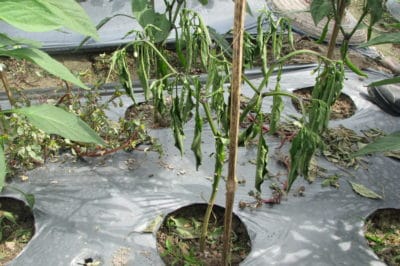Watering Issues
Peppers can be highly sensitive to getting too dry. If you can stick your finger into the soil and it feels dry, then your pepper plant is thirsty. Peppers should receive 1-2 inches of water per week, adjusted for precipitation. This should be spread out over the week, not given all at once and then neglected for a week.
On the other end, soggy soil can also cause pepper plants to wilt. Look for signs of water sitting on the surface or dig out around the roots of your plant to ensure there is no standing water. If you do find areas where water pools, cultivate that soil and amend it with sand, coconut husk, or aged wood chips.
Climate
Peppers are a warm weather species and they like the heat, but temperatures soaring up past 90°F(32°C) can fatigue them and cause wilt. Harsh direct sunlight will cause this same scenario. Protect pepper plants from harsh midday sun with shade cloth, or by planting them under a taller companion plant that will provide dappled light. The overall health of peppers plants is improved by:
- Accurate Watering
- Aerobic Compost
- Mulch Around Plant Bases
- Temperature and Sunlight Control
Pests and Disease
Inspect your plant for visual signs of insect infestation. Some beetles and aphids will cause symptoms similar to wilting. Most pest-related issues associated with wilting plants, however, are caused by root eating nematodes. These will require a lab test to identify, and this problem is remedied through soil amendment and aerobic compost application.
There are two diseases that can affect peppers and cause wilting. Fungal wilt is more common of the two and starts with the bottom leaves moving upward. Bacterial wilt is less common but can affect peppers. This disease is characterized by wilting plants and blackened rotting stems.
Unfortunately, these diseases are incurable and plants affected should be removed. To ensure the disease doesn’t spread or remain in the soil, the best course of action is to send soil samples to a lab that can give you specific amendment instructions.
Applications of aerobic living compost and compost tea will combat any pathogen present in the soil. Crop rotation is another tool to use, farm experts claim that it can take up to 3 years to eliminate fungal wilt with crop rotation. A combination of strategies is the best course to take.
